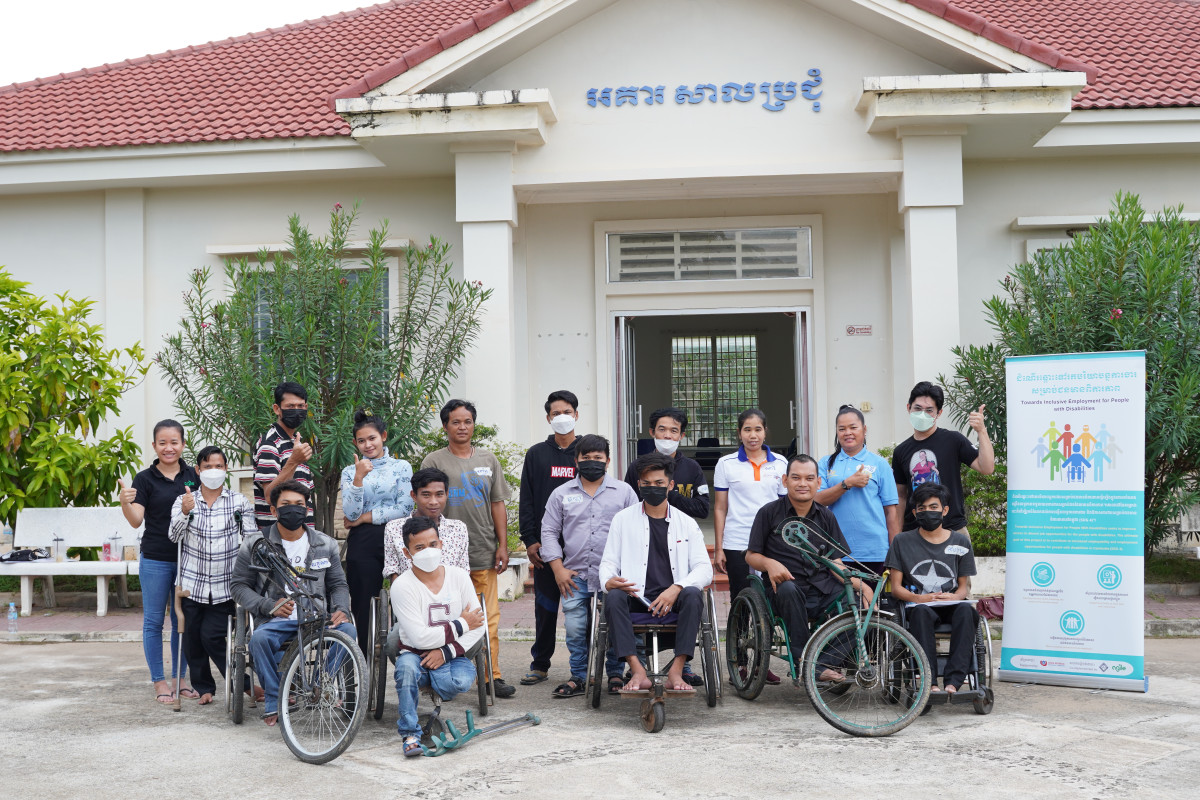The new ‘People with Disabilities’ focused project and its first meeting of Technical Working Group
Published: Aug 9, 2022 Reading time: 4 minutes Share: Share an articleIn Cambodia, people with disabilities (PwDs) are estimated to represent 2% to 9.5% of the total population. It is reported that the group would most likely experience more economic drawbacks than other citizens, especially in accessing formal education or Technical and Vocational Education and Training (TVET). Accessing decent employment opportunities has also been one of the barriers for this respective group.

The ‘Toward Inclusive Employment for People with Disabilities’ project is co-implemented by People in Need Cambodia and Agile Development Group with the purpose of contributing to increased employability and employment opportunities for people with disabilities in Phnom Penh, Cambodia, that is aligned with SDG 4 (Quality Education). The project will promote inclusive education by focusing on providing technical support on the development of guidelines for inclusive education and training of trainers, as well as technical assistance to the training centers. Along with this, up-to-date and people with disabilities friendly equipment will also be provided to the training center to ensure the training program is accessible and reliable for people with disabilities. During the last phase of the project, there will be support for business incubation program and entrepreneurship. All these activities are exclusively funded by the Government of the Czech Republic through the Czech Development Agency.
Started implementing late last year, this project will run until 2023. One of the key activities of this project is the formation of a Technical Working Group (TWG) to work on inclusive education guidelines. As of recently, led by Agile Development Group, we were able to kick off the very first TWG, which took place on 23-24th May, 2022. This activity aims to undertake a rigorous assessment and ideation of best practices in inclusive education for people with disabilities in the Cambodian context, and to gain practical insight on how to overcome barriers to inclusive TVET program for this respective group with the involvement of relevant government representatives, TVET institutions, CSO representatives, and people with disabilities groups.
In this first meeting, we are honored to have His Excellency Em Chan Makara, Secretary of State of the Ministry of Social Affairs, Veterans and Youth Rehabilitation, and Secretary General of the Disability Action Council Secretariat; Mr. Ian Jones, Executive Director and Technical Advisor of Agile Development Group; and Mrs. Barbora Zackova, Head of Development Section of the Embassy of the Czech Republic in Cambodia. Along with above-mentioned representatives, we also have representatives from relevant government institutions, TVET institutions, People with Disabilities groups, and relevant Civil Society Organizations.
During the opening speech, H.E Em Chan Makara stresses, “The government works hard to raise awareness on the importance of technical and vocational training to modernize technical and vocational education and training programs, as well as to focus the program closer to persons with disabilities, based on the needs of the labor market”.
For the assessment of the barrier to inclusive TVET education for People with Disabilities, we utilize ‘Human-Centered Design’ approach for the process as it helps the project implementers formulate solutions that involve human perspective through building empathy with our target groups, generate a bunch of ideas based on their actual experiences, building prototypes, sharing our work progress with the people we are designing for, and last but not least, putting out the solutions to meet our users’ need, which are people with disabilities.
“Listening to the challenges faced by those with hearing impairment makes me feel overwhelmed. When we think our life is hard, now imagine living with the disabilities and unable to express our feeling”, says a representative of Disability Action Council during his presentation.
To collect people with disabilities’ actual experiences and concerns, group discussions were formed among participants to conduct empathy mapping and define barriers to inclusive TVET faced personally by individuals. Along with certain barriers defined, participants were also asked to ideate solutions to each issue they raised.
Our project does not limit to certain types of impairment. We support all those with upper, lower, visual, and hearing impairments and with their participation in the technical working group meeting, we are able to identify what are the most common barriers faced especially by each of them and put them at the core of our newly proposed TVET program guidelines.
As a meeting result, we were able to list down a set of key recommendations for the new inclusive guidelines.
• Policy and system formulation by building commitment to inclusion, planning for inclusion through conducting needs assessment with trainees with disabilities and assessing infrastructure/environment accessibility.
• Encouraging participation through outreach and recruitment, provision of financial supports/scholarships, career guidance and counselling, and more participation in special education.
• Provision of capacity building to TVET institutions.
• Mainstreaming disability inclusive training system.
• Ensuring accessible and reasonable accommodation by setting up adaptable facilities and physical infrastructure.
• Transition to work or self-employment through career counselling and entrepreneurship support to people with disabilities.
Moving forward, Agile Development Group will conduct training on disability inclusive guidelines to TVET employees, develop training courses, and the project committees will work on identifying potential TVET centers that can incorporate the new inclusive training curriculum into their system.


